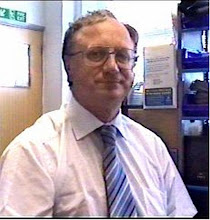... Or so the story goes.
(In fact, if you read the story, it turns out that the Blind don't actually see it as a handicap; and the sighted person is treated as a freak!)
Dare I suggest that this has a resonance for those of us that work in IT? We have built up our skills over a period of time, and take pride in our ability to do various tasks. The users that we support tend to have at best, a level of knowledge that is patchy. In many cases, they don't even appreciate how little they know - you then get the person that has installed instant messaging at home, so therefore thinks that they can do this at work and is unaware of the larger issues involved or the problems that it might cause.
What makes it worse is that for many of us, we have to work with business people that don't understand how it all hangs together (and often don't want to); but immediately something goes wrong, they want to micro manage fixing the problem - rather like someone grabbing the steering wheel in a car when it goes into a skid.
I think that those in the medical profession would understand some of this. They spend many years training, before going on to their specialisation. They get patients that have abused their bodies, smoking, drinking, eating too much, and when the patient falls ill, it is expected that the doctor can issue a pill, potion or injection that will instantly cure the problem.
The reality is course that there are many things doctors cannot do; in fact, they all take an oath to "First, do no harm". Although medical science is improving almost daily, all they can do is delay the inevitable. And in many cases, their advice is ignored; and I think almost everyone in IT can relate to that.
In many ways, we are like the Guild of Handlemen of Holywood (apologies to Terry Pratchett - "Moving Pictures"); we are not passing knowledge down from father to son, but more around to each other at the moment. It's also true that as the technology develops, practices have to change, and we see that happening at a much faster rate than any other profession has in the past.
I am a great believer that we need IT to be recognised as a profession and that the practitioners should all be encouraged to seek some form of professional or qualilfied status. This will not be easy - IT as an industry is still a very new area of expertise, whatever date you mark it from. Although there are those that worked with mainframes in the 50s, 60s & 70s, the speed of growth in the nature and importance of IT over the last 3 decades is the crucial issue.
As a result, we should realise that we are setting the standards by which others will follow; we need to look up from the tasks we have to do on a daily basis and take stock of what is happening. We have to ask ourseleves the right questions - not just how to do something, but why should we do it (and sometimes why not).
I think we should begin not by considering ourselves as "one eyed men", but that those who we see as blind are actually just newly born; and that they can learn to see as well as us.
Monday, 16 March 2009
Subscribe to:
Post Comments (Atom)

No comments:
Post a Comment